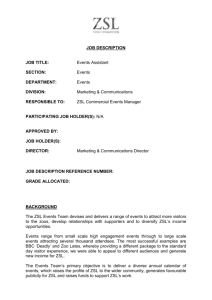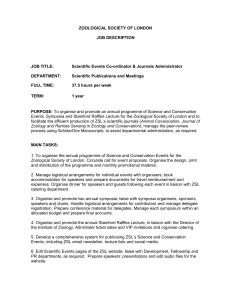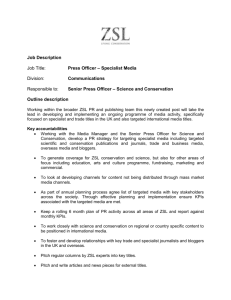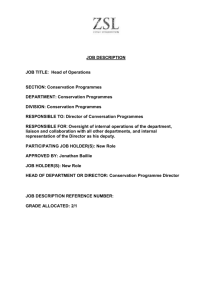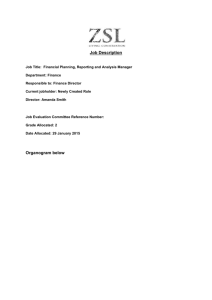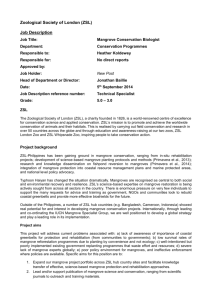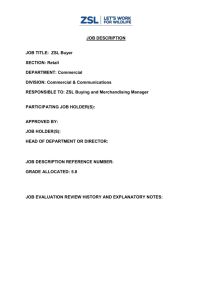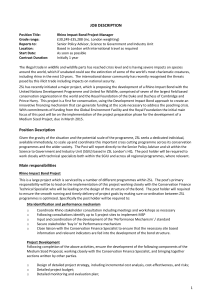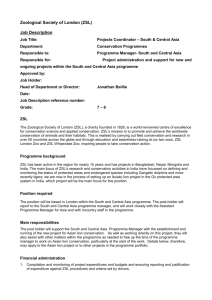Mangrove Conservation Scientist - Full Job Description
advertisement
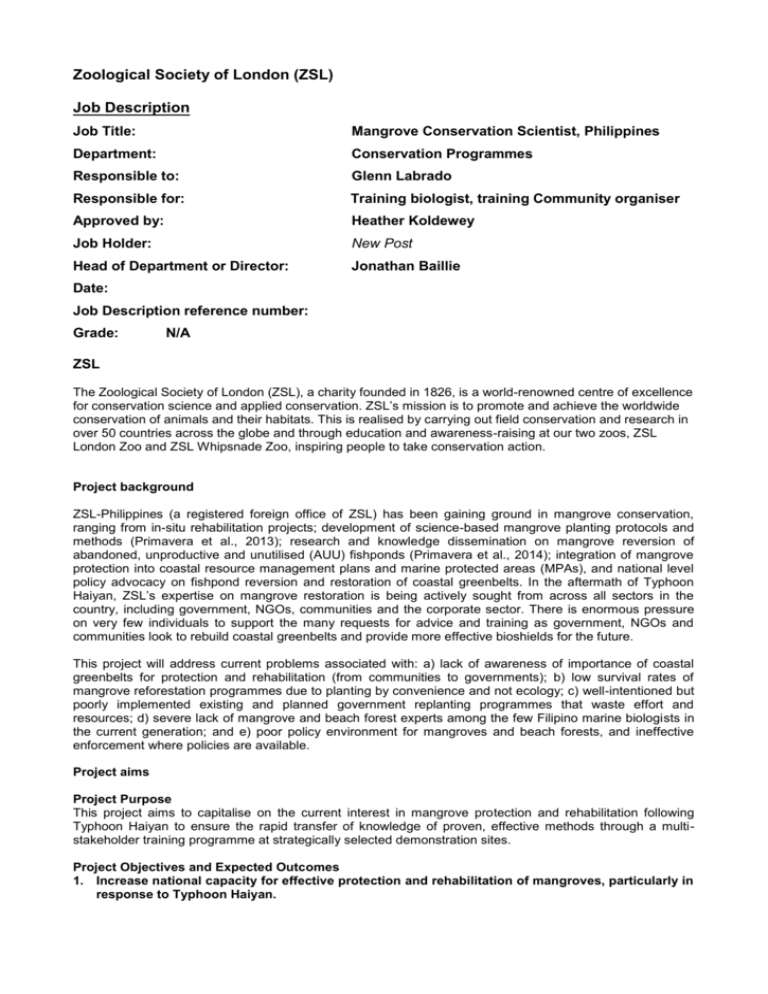
Zoological Society of London (ZSL) Job Description Job Title: Mangrove Conservation Scientist, Philippines Department: Conservation Programmes Responsible to: Glenn Labrado Responsible for: Training biologist, training Community organiser Approved by: Heather Koldewey Job Holder: New Post Head of Department or Director: Jonathan Baillie Date: Job Description reference number: Grade: N/A ZSL The Zoological Society of London (ZSL), a charity founded in 1826, is a world-renowned centre of excellence for conservation science and applied conservation. ZSL’s mission is to promote and achieve the worldwide conservation of animals and their habitats. This is realised by carrying out field conservation and research in over 50 countries across the globe and through education and awareness-raising at our two zoos, ZSL London Zoo and ZSL Whipsnade Zoo, inspiring people to take conservation action. Project background ZSL-Philippines (a registered foreign office of ZSL) has been gaining ground in mangrove conservation, ranging from in-situ rehabilitation projects; development of science-based mangrove planting protocols and methods (Primavera et al., 2013); research and knowledge dissemination on mangrove reversion of abandoned, unproductive and unutilised (AUU) fishponds (Primavera et al., 2014); integration of mangrove protection into coastal resource management plans and marine protected areas (MPAs), and national level policy advocacy on fishpond reversion and restoration of coastal greenbelts. In the aftermath of Typhoon Haiyan, ZSL’s expertise on mangrove restoration is being actively sought from across all sectors in the country, including government, NGOs, communities and the corporate sector. There is enormous pressure on very few individuals to support the many requests for advice and training as government, NGOs and communities look to rebuild coastal greenbelts and provide more effective bioshields for the future. This project will address current problems associated with: a) lack of awareness of importance of coastal greenbelts for protection and rehabilitation (from communities to governments); b) low survival rates of mangrove reforestation programmes due to planting by convenience and not ecology; c) well-intentioned but poorly implemented existing and planned government replanting programmes that waste effort and resources; d) severe lack of mangrove and beach forest experts among the few Filipino marine biologists in the current generation; and e) poor policy environment for mangroves and beach forests, and ineffective enforcement where policies are available. Project aims Project Purpose This project aims to capitalise on the current interest in mangrove protection and rehabilitation following Typhoon Haiyan to ensure the rapid transfer of knowledge of proven, effective methods through a multistakeholder training programme at strategically selected demonstration sites. Project Objectives and Expected Outcomes 1. Increase national capacity for effective protection and rehabilitation of mangroves, particularly in response to Typhoon Haiyan. To support the development and implementation of a national training programme for improved mangrove rehabilitation by government agencies, NGOs and local communities, including: a) Establish a dedicated ZSL-Philippines Mangrove and MPA Training Team b) Deliver ‘training of trainers’ sessions e.g. to national and local government agencies, NGOs, universities, private sector. c) Develop targeted, web-based training modules on mangrove protection, mangroves and MPAs, mangrove rehabilitation, fishpond reversion, and mangrove-friendly livelihoods for communities, NGOs, government agencies and the corporate sector. d) Publish simplified versions of our current (comprehensive) manuals appropriate for communities, and translated into 3 dialects, Ilonggo, Cebuano and Tagalog. e) Publish and disseminate a manual on how to implement MPAs with mangroves f) Disseminate key findings on the impact of Typhoon Haiyan on the coastal environment by holding a National Mangrove Conference. 2. Establish two demonstration sites for coastal protection, using mangrove greenbelts and MPAs. To target one site badly affected by Typhoon Haiyan and a second unaffected site (both in Panay) as demonstration sites, using mangrove rehabilitation with MPAs as mechanisms to restore coastal bioshields, fisheries and biodiversity, while rebuilding associated livelihoods. Our expertise will help: a) Recover and strengthen one community-managed mangrove MPA site hit by Typhoon Haiyan b) Provide evidence for positive impacts mangrove MPAs have on marine life through annual biological surveys that engage and train local communities and government. c) Integrate MPA and mangrove management into local government long-term rehabilitation plans through formal adoption of a technical manual. d) Use sites to demonstrate practical effective methods (biological and socioeconomic) for recovery as part of the mangrove training programme through practical site-based. Position The successful applicant will be based in the ZSL-Philippines head office in Iloilo, with time spent in the second office in Cebu and our field sites (currently central and western Visayas). It is anticipated they will also spend some time in Manila at relevant meetings, workshops and conferences. The individual will be line-managed by Glenn Labrado, but will work very closely with Dr Jurgenne Primavera, Angelie Nellas and the current team of biologists. Main responsibilities Stakeholder relationships 1. Assistance with identification of government, academic, private and NGO partners and study sites and development of working relationships, including input to Memoranda of Understanding or contracts to formalise and clarify details of partnership. 2. Assistance with liaison with relevant government officials to ensure the project is meeting policy needs and that formal and informal government support is assured at all stages in project development and implementation. 3. Liaison with other academic, conservation and development organisations working in-country as well as internationally, to assess current data availability and gaps and ensure that the work of the project complements and builds on existing initiatives. 4. Regular communication with in-country partners regarding study design, progress, data sharing and logistics. Project management 5. Setting of and adherence to project objectives and annual work plan as agreed with the appropriate line managers via ZSL’s Performance and Development Review process. 6. Liaison with line manager and project personnel to ensure that agreed work is completed on schedule, to budget and in compliance with ZSL health and safety procedures and UK/in-country laws and regulations. 7. Where necessary, the recruitment of suitable field team(s) in collaboration with line managers and/or other relevant project personnel. 8. Collaboration with line mangers and project team to manage local staff, plan work schedules (including monitoring of time sheets where required and signing off on leave and illness), organise and record per diems and manage travel logistics (including keeping of vehicle travel logs). 9. Collaboration with project manager and project team in the purchase (according to procurement plans as required), management and recording of survey equipment, supplies and vehicles (including keeping of equipment log), ensuring relevant equipment is insured and taxed. 10. Management of own budget and accounts and keeping of financial records, with submission of a financial report every month to the relevant line managers or administrator. 11. Submission of monthly technical reports to the line managers and contribution to technical and financial reports to project donors as required. 12. Adhere to the ZSL field health and safety policy and insure it is followed in all managed projects. Research and fieldwork 13. Planning of fieldwork, following a scientifically-sound experimental design (including methods, timeline, budget and suitable study sites) agreed with the line managers and, if relevant, project steering committee. 14. Collation and analysis of existing data and information from previous related research, and relevant data from other partners in the project, as relevant. 15. Where necessary, execution of field surveys, through either direct participation or oversight and regular checks of trained field team, ensuring all surveys are completed to budget and on time and data are entered and stored in electronic database. 16. Establishment of system for control of data quality. 17. Data analysis using GIS and statistical software packages where necessary. Capacity building 18. Training of relevant project and partner staff in data collection, entry, management and analysis, to ensure qualified field personnel during field surveys and to continue data collection, analysis and quality control after project termination. 19. Selection (where appropriate), guidance and supervision of local and international students carrying out agreed research projects in conjunction with the project, including training in research, survey and analysis techniques as appropriate. Dissemination 20. Publication of research findings in scientific journals, policy papers and technical reports (e.g. ZSL Conservation Report). 21. Contribution to regular updates for partners/donors/stakeholders, regular blogs and updates for the ZSL website and occasional longer pieces for the ZSL magazine. 22. Promotion of relevant areas of the project and ZSL’s work in the project area through media interviews and articles as required. 23. Organisation and facilitation of logistical arrangements for in-country meetings, training sessions and workshops and preparation of relevant materials, with the support of the project team. 24. Input to any project reports required by government and other in-country stakeholders. 25. Dissemination of the project findings in international fora, to facilitate lesson-learning and information exchange. Representation and promotion of ZSL 26. Representation of ZSL at, and participation in, relevant national, regional and international conservation policy/planning events (as funds allow). 27. Participation in the development of ZSL’s conservation strategy and policies, particularly with reference to the postholder’s own area of operation. Project development 28. Assistance with development of funding proposals for the project as required/advantageous. 29. Development of new aspects of the project that are in line with ZSL’s long-term strategic aims, and assistance in gaining national/regional/international recognition and funding for such proposed work. 30. Assistance with identification of conservation needs and funding sources for other potential projects which fall within ZSL’s area of expertise and interest. General 1. Support with project fundraising activities by sourcing potential donors and contributing to funding applications. 2. Ensuring all activities and procedures follow ZSL policies, particularly with regard to health and safety, finance, human resources and communications, and dissemination of ZSL policies to project staff as necessary. 3. Execution of field visits or participation in fieldwork. 4. Ensure that ZSL’s policy for equality of opportunity is adhered to and promoted in all aspects of the post holder’s work 5. Ensure effective quality control and continuous improvement in all aspects of the work and responsibilities attached to this post 6. Comply with and promote ZSL’s Health and Safety Policies and Procedures and undertake recommended Health and Safety training as and when necessary. 7. Be committed to professional self-development as necessary for the successful carrying out of the job 8. Undertake such other duties as are commensurate with the grade of the post, as may be reasonably required at the initial place of work or at other locations. Qualifications, Knowledge and Experience Required 1. A higher degree in an appropriate subject 2. At least 3 years’ experience of field conservation science. 3. Existing track record of scientific research on mangroves, including publications 4. Excellent written and spoken English 5. Strong organisational, interpersonal and presentation skills 6. Proven fundraising and report-writing ability 7. Good communication skills and experience with the media and public speaking 8. Proven ability to work effectively with teams and senior managers NB: This job description is designed to outline a range of main duties that may be encountered. It is not designed to be an exhaustive list of tasks and can be varied in consultation with the post holder in order to reflect changes in the job or the Society.
